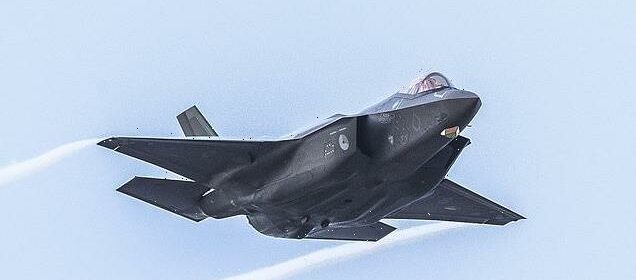Dutch F-35s intercept three Russian military aircraft near Poland

Dutch F-35s scramble to intercept Russian spy plane and fighter jets approaching NATO-member Poland’s airspace
- Russian jets approached Polish airspace from Russian-controlled Kaliningrad
- They were met by two Dutch F-35 fighters, which escorted them back
A pair of Dutch F-35 fighters were scrambled overnight to intercept a formation of three Russian warplanes near NATO member Poland.
The Russian jets – one spy plane and two fighters – were met as they approached Polish airspace from the Russian-controlled enclave of Kaliningrad, and were escorted back out of NATO territory, the Netherlands’ defence ministry said Monday.
‘The then unknown aircraft approached the Polish NATO area of responsibility from Kaliningrad,’ according to Reuters’ translation of the ministry’s statement.
Kaliningrad is a Russian Baltic coast enclave located between NATO and European Union members Poland and Lithuania.
‘After identification, it turned out to be three aircraft: a Russian IL-20M Coot-A that was escorted by two Su-27 Flankers. The Dutch F-35s escorted the formation from a distance and handed over the escort to NATO partners.’
A pair of Dutch F-35 fighters (pictured, file photo) were scrambled overnight to intercept a formation of three Russian warplanes near NATO member Poland
The Il-20M Coot-A is NATO’s reporting name for the Russian Ilyushin Il-20M reconnaissance aircraft while the Su-27 Flankers are NATO’s reporting name for the Sukhoi Su-28 fighter aircraft.
Russia’s defence ministry did not immediately respond to Reuters’ request for a comment.
The Netherlands’ defence ministry said that eight Dutch F-35s are stationed in Poland for February and March.
Tensions between Russia and the European Union have been mounting over the borders of Kaliningrad, which neighbours Poland, Lithuania and the Baltic Sea.
Poland has been building a 120-mile electronic fence along its border with the enclave over fears Russia could pour migrants through its territory in an effort to destabilise Europe, as was seen in Belarus in 2021 and 2022.
The intercept came amid fears that Vladimir Putin is preparing to launch a massive new offensive to gain the momentum in his war in Ukraine.
Ukraine and its western allies have been monitoring Russian troop buildups on the borders, with NATO chief Jens Stoltenberg saying on Monday that the offensive has already begun in the east of the country.
British military chiefs said the Russian president’s troops have been commanded to advance in ‘most sectors’ but are struggling to achieve a major breakthrough.
Ukrainian servicemen gather around a BMP-2 infantry fighting vehicle on a road outside the frontline town of Bakhmut, amid Russia’s attack on Ukraine, in Donetsk region, February 11
The Ministry of Defence (MoD) said on Tuesday that the Russians have ‘not massed sufficient offensive combat power’ on any one axis to ‘achieve a decisive effect’.
Its intelligence assessment said Wagner Group mercenaries have likely made ‘further small gains’ around the northern outskirts of the heavily-contested town of Bakhmut.
But the Ukrainian defence is continuing and the Russian advance to the south ‘has likely made little progress’.
Further north, in Kreminna-Svatove, the MoD said the Russians are making ‘continuous offensive efforts’ but on ‘too small a scale to achieve a significant breakthrough’.
‘Overall, the current operational picture suggests that Russian forces are being given orders to advance in most sectors, but that they have not massed sufficient offensive combat power on any one axis to achieve a decisive effect,’ the MoD said.
Defence sources believe the Russian president’s feared spring offensive may not be launched simultaneously across the front line.
But the use of conscripts during the increasing military activity to attack in specific areas could be a means of testing weaknesses in the Ukrainian position.
Meanwhile, Defence Secretary Ben Wallace will join Nato colleagues in Brussels to discuss the co-ordination of weapons supplies for Volodymyr Zelensky’s resistance.
Nato secretary-general Jens Stoltenberg anticipates the defence ministers will discuss the possible supply of fighter jets to Kyiv.
The UK will be the first nation to start training Ukrainian pilots on Nato-standard aircraft, and Mr Wallace has been asked to investigate which planes the UK could potentially supply.
Source: Read Full Article

